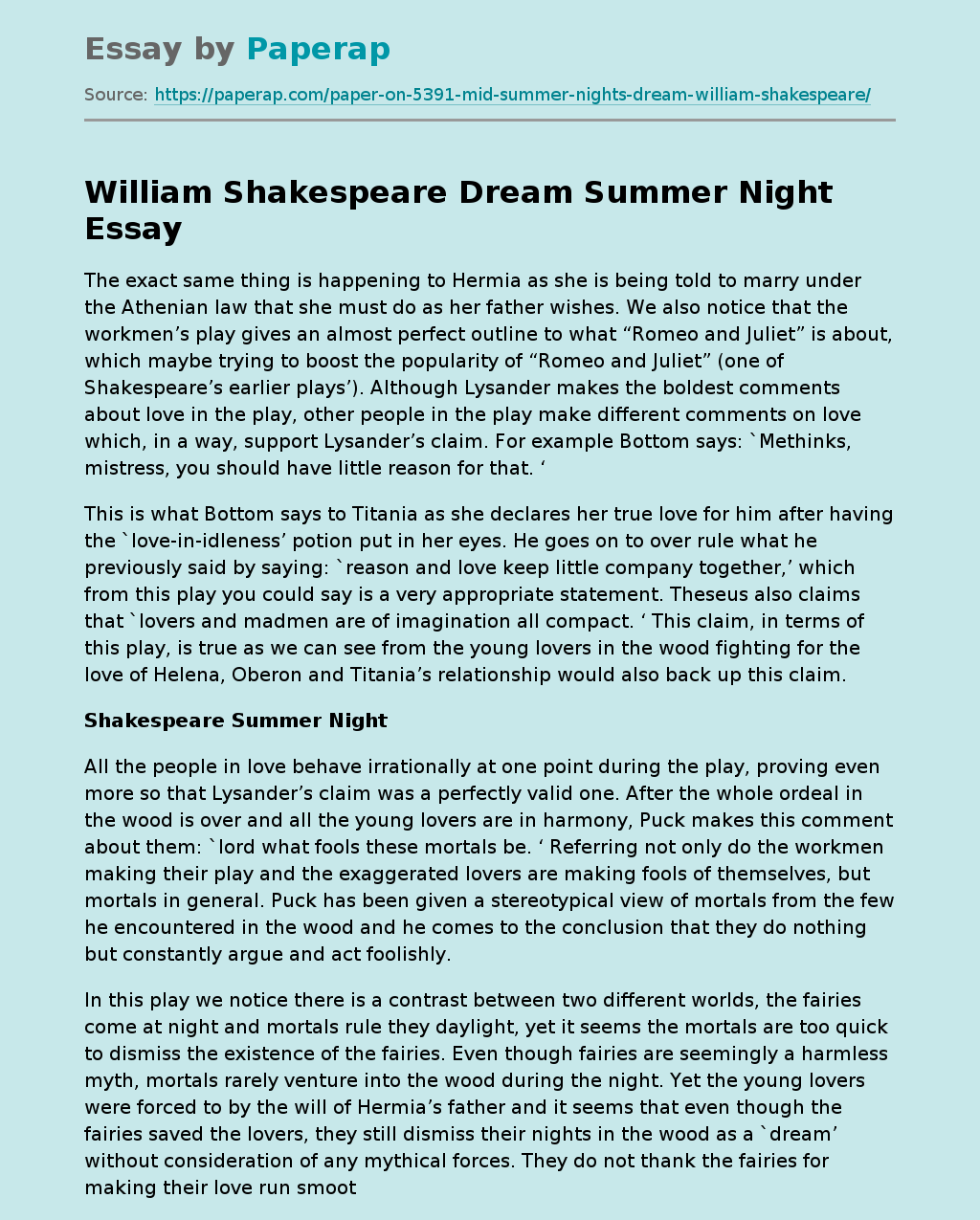William Shakespeare Dream Summer Night
The exact same thing is happening to Hermia as she is being told to marry under the Athenian law that she must do as her father wishes. We also notice that the workmen’s play gives an almost perfect outline to what “Romeo and Juliet” is about, which maybe trying to boost the popularity of “Romeo and Juliet” (one of Shakespeare’s earlier plays’). Although Lysander makes the boldest comments about love in the play, other people in the play make different comments on love which, in a way, support Lysander’s claim.
For example Bottom says: `Methinks, mistress, you should have little reason for that. ‘
This is what Bottom says to Titania as she declares her true love for him after having the `love-in-idleness’ potion put in her eyes. He goes on to over rule what he previously said by saying: `reason and love keep little company together,’ which from this play you could say is a very appropriate statement.
Theseus also claims that `lovers and madmen are of imagination all compact. ‘ This claim, in terms of this play, is true as we can see from the young lovers in the wood fighting for the love of Helena, Oberon and Titania’s relationship would also back up this claim.
All the people in love behave irrationally at one point during the play, proving even more so that Lysander’s claim was a perfectly valid one. After the whole ordeal in the wood is over and all the young lovers are in harmony, Puck makes this comment about them: `lord what fools these mortals be.
‘ Referring not only do the workmen making their play and the exaggerated lovers are making fools of themselves, but mortals in general. Puck has been given a stereotypical view of mortals from the few he encountered in the wood and he comes to the conclusion that they do nothing but constantly argue and act foolishly.
In this play we notice there is a contrast between two different worlds, the fairies come at night and mortals rule they daylight, yet it seems the mortals are too quick to dismiss the existence of the fairies. Even though fairies are seemingly a harmless myth, mortals rarely venture into the wood during the night. Yet the young lovers were forced to by the will of Hermia’s father and it seems that even though the fairies saved the lovers, they still dismiss their nights in the wood as a `dream’ without consideration of any mythical forces. They do not thank the fairies for making their love run smooth as previously it was in havoc. We have a story from the fairies and one from the mortals, when they meet it gives the play a mysterious twist but also ends with a traditional “happy ending”, as with all fairy stories.
From this play you gain many contrasting views on love, from most of the characters involved, but to say `the course of true love never did run smooth,’ is not true; to say that sometimes true love does not smooth is certainly true. In this play none of the love we are told about has always run smooth and at the end we are left wondering if of Oberon and Titania’s are now truly happy.
The four young lovers didn’t have certain futures until they had their `dream’ like experience in the woods with the fairies. Theseus had to fight and be determined to killto win the love of Hippolyta. We never find out if Bottom had true love for Titania, even though she did for him; yet that was only short lived as Oberon changed her back to normal with the `love-in-idleness’. I conclude that the statement made by Lysander: `the course of true love never did run smooth,’ is mostly true because in the pay all the lovers experience problems caused by love, and they are forced to work hard to make sure their love with `run smooth’. It seems all relationships are expected to have their ups and downs.
William Shakespeare Dream Summer Night. (2019, Dec 05). Retrieved from https://paperap.com/paper-on-5391-mid-summer-nights-dream-william-shakespeare/

